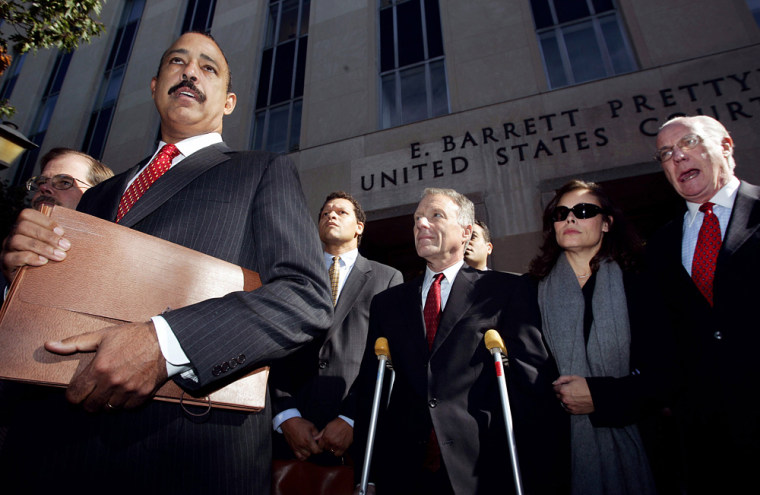WASHINGTON — The oversized Ceremonial Courtroom on the sixth floor of U.S. District Court — a room whose wall's display the portraits of the numerous chief judges of the court — was filled with an estimated 200 reporters and court house personnel for I. Lewis "Scooter" Libby’s arraignment on Thursday morning for charges stemming from the CIA leak probe.
With the defense and prosecution teams talking at their respective table just before the judge entered, reporters fidgeted to silence cell phones and conceal their still functional Blackberries so that they could bang out contemporaneous accounts of the proceedings to their audiences.
The entire arraignment lasted only 10 minutes. The most significant detail may have been the introduction of Libby’s expanded defense team; in particular, bringing in prominent criminal defense lawyer Ted Wells just hours before his arraignment.
Criminal defense team
Wells, a distinguished African American attorney and a partner in the New York firm Paul Weiss, is noted for his trial work.
He is also well known in this courthouse and shook hands with many of the old-time court security officers he got to know during his defenses of the likes of former Agriculture Secretary Michael Espy, former Labor Secretary Raymond Donovan, former U.S. Sen. Robert Torricelli and financier Michael Milken.
Washington lawyer William Jeffress was also present as part of the Libby defense team. Likewise, he is well known for white-collar criminal defense work.
Special Prosecutor Patrick Fitzgerald acknowledged during the session that Jeffress had represented another client during the grand jury phase of his investigation.
That client, Mary Matalin, a former adviser to Vice President Cheney — whose name was not mentioned in court — had told Jeffress that she had consented to his representation of another client. Fitzgerald said he did not object.
A pat before the plea
Libby, wearing a blue suit and white shirt, entered the court on crutches (he is recovering from a foot injury). His wife, Harriet Grant, a former lawyer on the Senate Judiciary Committee, was at his side, wearing an all black pants-suit, stiletto heeled ankle boots and a gray scarf, with sunglasses atop her head.
Just before Libby took his chair, his wife grabbed his sleeve with one hand and gave him a pat on his bottom with the other, then whispered in his ear. She took a seat just behind him.
Libby entered his plea in front of U.S. District Judge Reggie Walton, a former prosecutor who has spent 20 years as a judge in Washington. Walton was randomly selected among the trial judges at district court. The judge has recently overseen the civil lawsuit of former bioweapons scientist Stephen J. Hatfill against the Justice Department for linking him to the 2001 anthrax attacks.
Walton asked Libby to stand and asked if he had a plea. "Yes, I do," he told the judge. "What is your plea?" responded Walton. "With respect, your honor, I plead not guilty," he said.
Timing
Once the charges were read and the judge asked for his response, Libby said they would be ready for trial. The timing of the trial, and the motions hearing leading up to it, took up the bulk of the next five minutes.
Special Prosecutor Patrick Fitzgerald estimated it would take two weeks for the government to present its case against Libby (the exact timing would depend on pretrial motions by his attorneys).
Jeffress told the judge that it "may be a little early" to predict when the defense team would be ready for trial.
At issue is the delivery of what Fitzgerald described as "voluminous" amount of discovery documents, many of them classified. It would take at least four weeks just to get the defense team clearance to read the material.
The judge raised the issue of rules requiring a speedy trial and asked Libby is he would waive them. Libby said he would.
A date was set for the first motions hearing — Feb. 3, 2006 at 9:30 a.m. The judge said he wanted the case resolved as expeditiously as possible.
Fingerprinted
After the hearing, Libby was taken by marshals for "intake" processing. This is a procedure in which defendants typically are fingerprinted and have their photograph taken.
Court officials said it was done by the book, following the orders of Chief Judge Thomas Hogan. Officials said nothing was changed. "It was done like every other defendant processed here," said one.
But the wait — in the first floor lobby of the courthouse — lasted more than 30 minutes, and was somewhat awkward due to media attention, leading the defense team as well as Libby and his wife to pace the hallway in an attempt to avoid a scrum of reporters peppering them with questions.
Jeffress declined to say how long a trial might take. "It's too early to say," he told reporters.
Plea, a declaration of innocence
After being processed, Libby, escorted by his defense team and wife, exited the courthouse to be greeted by a throng of reporters outside.
"In pleading not guilty," said Wells, "he has declared to the world that he is innocent. He has declared that he intends to fight the charges in the indictment and he has declared that he wants to clear his good name, and he wants a jury trial."
Back in the 4th-floor pressroom, filled with wire reporters and sketch artists putting the finishing touches on their work, a judge whose chambers are in the same hallway dropped by.
"Pretty impressive legal team," he said, "especially Wells."
